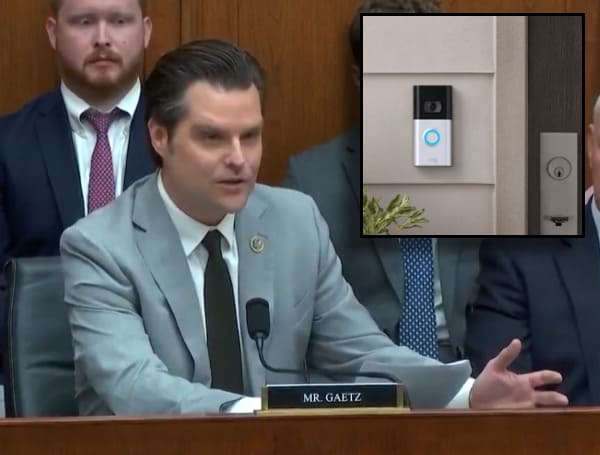Rep. Matt Gaetz The Federal Trade Commission (FTC) charged home security camera company Ring in May 2023 with compromising its customers’ privacy
The Federal Trade Commission (FTC) charged home security camera company Ring in May 2023 with compromising its customers’ privacy by allowing any employee or contractor to access consumers’ private videos and by failing to implement basic privacy and security protections, enabling hackers to take control of consumers’ accounts, cameras, and videos.
“Ring’s disregard for privacy and security exposed consumers to spying and harassment,” said Samuel Levine, Director of the FTC’s Bureau of Consumer Protection said in May. “The FTC’s order makes clear that putting profit over privacy doesn’t pay.”
On Thursday, Rep. Matt Gaetz (FL-01) highlighted personal security in questioning FTC Chair Lina Khan on the data privacy of Ring surveillance devices.
In the news: Rep. Matt Gaetz Stands Ready To Join Democrats Against Biden Sending Ukraine Cluster Munitions
“Millions of Americans have Ring doorbell cameras, and your agency recently put out a correspondence saying, “During a three-month period in 2017, a ring employee viewed thousands of videos of female users in their bedrooms And bathrooms including videos of rings own employees,” said Gaetz.
“I thought that when people got Ring, it was to enhance their personal security, not to have their 87-year-old relative in an ALF sexually propositioned their children to be slurred at and then to be told that they were going to be killed if they didn’t pay Bitcoin ransom,” Gaetz said.
According to the FTC, Ring deceived its customers by failing to restrict employees’ and contractors’ access to its customers’ videos, using customer videos to train algorithms, among other purposes, without consent, and failing to implement security safeguards.
These failures amounted to egregious violations of users’ privacy. For example, one employee over several months viewed thousands of video recordings belonging to female users of Ring cameras that surveilled intimate spaces in their homes such as their bathrooms or bedrooms.
In the news: Rep. Matt Gaetz Point Blank Asks FBI Director Wray, “Are You Protecting The Bidens”
The employee wasn’t stopped until another employee discovered the misconduct. Even after Ring imposed restrictions on who could access customers’ videos, the company wasn’t able to determine how many other employees inappropriately accessed private videos because Ring failed to implement basic measures to monitor and detect employees’ video access.
The FTC also said Ring failed to take any steps until January 2018 to adequately notify customers or obtain their consent for extensive human review of customers’ private video recordings for various purposes, including training algorithms.
Ring buried information in its Terms of Service and Privacy Policy, claiming it had a right to use recordings obtained in connection with its services for “product improvement and development,” according to the complaint.
According to the complaint, Ring also failed to implement standard security measures to protect consumers’ information from two well-known online threats—“credential stuffing” and “brute force” attacks—despite warnings from employees, outside security researchers and media reports. Credential stuffing involves the use of credentials, such as usernames and passwords, obtained from a consumer’s breached account to gain access to a consumer’s other accounts. In a brute force attack, a bad actor uses an automated process of password guessing—for example, by cycling through breached credentials or entering well-known passwords—hundreds or thousands of times to gain access to an account.
Despite experiencing multiple credential-stuffing attacks in 2017 and 2018, Ring failed, according to the complaint, to implement common tactics—such as multifactor authentication—until 2019. Even then, Ring’s sloppy implementation of the additional security measures hampered their effectiveness, the FTC said.
As a result, hackers continued to exploit account vulnerabilities to access stored videos, live video streams, and account profiles of approximately 55,000 U.S. customers, according to the complaint.
Bad actors viewed some customers’ videos and used Ring cameras’ two-way functionality to harass, threaten, and insult consumers—including elderly individuals and children—whose rooms were monitored by Ring cameras and to change important device settings, the FTC said.
For example, hackers taunted several children with racist slurs, sexually propositioned individuals, and threatened a family with physical harm if they didn’t pay a ransom.
In the news: Rep. Gaetz Demands End To Controversial FISA Law That Feds Tapped To Target Americans
In addition to the mandated privacy and security program, the proposed order requires Ring to pay $5.8 million, which will be used for consumer refunds. The company also will be required to delete any customer videos and face embeddings, data collected from an individual’s face, that it obtained prior to 2018, and delete any work products it derived from these videos.
The proposed order also will require Ring to alert the FTC about incidents of unauthorized access or exposure of its customers’ videos and to notify consumers about the FTC’s action.
The Commission voted 3-0 to authorize the staff to file the complaint and stipulated final order. The FTC filed the complaint and final order in the U.S. District Court for the District of the District of Columbia.
Android Users, Click To Download The Free Press App And Never Miss A Story. Follow Us On Facebook and Twitter—signup for our free newsletter.
We can’t do this without your help; visit our GiveSendGo page and donate any dollar amount; every penny helps

